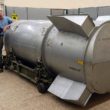When George W. Bush included Iran in the “axis of evil” in his State of the Union speech in January 2002, Iran had 200 centrifuges it could use to enrich uranium.
When Bush left office in 2009, Iran had 7,000 centrifuges.
There was a moment when his administration might have contained Tehran’s nuclear program. By 2003, the Iranians had seen how quickly the U.S. military disposed of Saddam Hussein in Iraq and the Taliban in Afghanistan, and feared they might be next.
In May of that year, Iran sent a letter by way of the Swiss embassy in Washington to the U.S. State Department, offering to negotiate several concessions, including Iran’s nuclear program and its relations with Israel.
Iran’s president in 2003 was moderate reformer Mohammad Khatami. Secretary of State Colin Powell wanted to pursue the offer, but Vice President Dick Cheney said no. Cheney adhered to the principle that governments don’t negotiate with their enemies.
AIPAC was pressuring the U.S. Senate to replace Obama’s Iran policy with Netanyahu’s Iran policy. The bill also committed the U.S. military to support Israel in any unilateral attack against Iran’s nuclear facilities. Netanyahu’s non-negotiable position is that Iran cannot enrich uranium even for a domestic energy program.
By 2010, Iran was enriching uranium to 20 percent, a critical step in the process of enrichment to 90 percent weapons-grade uranium, according to Kelsey Davenport, the director of nonproliferation policy at the bipartisan Arms Control Association.
By 2013, Iran had 20,000 centrifuges, with 10,200 in operation. Iran also had a 200-kilogram stockpile of 20-percent enriched uranium, closing in on the 225-240 kilograms required for a bomb—the point Israeli Prime Minister Benjamin Netanyahu said was a red line beyond which Israel would bomb Iran’s nuclear facilities. Iran was also expanding a heavy-water reactor, which could be used to produce plutonium, another route to a nuclear weapon.
Sanctioned Nuclear Expansion
Every U.S. president since Jimmy Carter has imposed economic sanctions on Iran. But the measures were “too weak to have a critical impact,” according to an April 2013 report published by the Center for Strategic and International Studies (CSIS), a D.C.-based national-security think tank.
Obama upped the game. During his first term, he pushed the Congress to pass “four major sanctions acts, impacting hundreds of companies, people, and assets,” according to CSIS. The European Union joined the U.S., enacting six major sanctions bills.
The sanctions took a toll. In 2013, according to the CSIS report:
• The value of the Iranian rial dropped 40 percent (against the dollar),
• Oil revenue, in decline for a decade, fell from $95 billion to $67 billion,
• The rate of inflation reached 24 percent.
In 2012, then-Secretary of State Hillary Clinton traveled to Oman for secret meetings with representatives of Iran’s government, as she recounts in her memoir.
In June 2013, moderate cleric Hassan Rouhani was elected president, winning more than the total vote of all five hardliners running against him. Five months later, in November 2013, Iran signed a “Joint Plan of Action” with the P5+1 (China, France, Germany, Russia, the United Kingdom, and the United States).
In exchange for limited relief from sanctions, access to $7 billion of frozen revenue, and a promise that no new sanctions would be imposed during negotiations (now extended through this month), Iran suspended its nuclear program, stopped most work at its heavy-water reactor, and began diluting its enriched uranium.
“Iran’s progress on its nuclear program was halted,” Davenport said in a webinar organized by Women’s Action for New Directions. “Iran also agreed to increased monitoring and verification, including snap inspections by the International Atomic Energy Agency [IAEA].”
The day after the November 2013 accord was signed in Geneva, Netanyahu protested that Iran had been given an “unbelievable Christmas present, the capacity to maintain this [nuclear] breakout capability for practically no concessions at all.”
When the U.S. Congress convened in January 2014, Israel—working through the American Israel Public Affairs Committee—set out to subvert the Obama administration’s negotiations with Iran. Its vehicle was a “trigger sanctions” bill sponsored by Senators Bob Menendez, D-NJ, and Mark Kirk, R-Il.
AIPAC is not a political action committee and doesn’t donate to candidates. But its 100,000 members include many of the largest Jewish donors in the country. Their political contributions are best measured by the contributions of regional pro-Israel PACs. At $341,170, Menendez was the third-highest recipient of pro-Israel PAC money between 2008-2014, according to MapLight, a nonprofit group that tracks political money. Kirk topped the list with $687,569.
Their bill included provisions that would have forced the Iranians to end the negotiations. In fact, it would have triggered more than sanctions. AIPAC was pressuring the U.S. Senate to replace Obama’s Iran policy with Netanyahu’s Iran policy. The bill also committed the U.S. military to support Israel in any unilateral attack against Iran’s nuclear facilities. Netanyahu’s non-negotiable position is that Iran cannot enrich uranium even for a domestic energy program. Although the bill had 60 Senate sponsors, it was blocked by then-Majority Leader Harry Reid.
A 2015 version of the Menendez-Kirk bill, stripped of some of the more egregious provisions, was voted out of the Banking Committee in January and is scheduled for a Senate vote this month.
Two Votes Shy
Jamil Abdi, a former congressional aide now working at the National Iranian American Council, predicts that 65 senators (53 Republicans and 12 Democrats) will vote for the bill—two votes shy of a veto-proof majority. The House passed a sanctions bill by a huge margin last year. As in 2014, Israel’s government and AIPAC are engaged in a campaign to pass the bill, which would almost certainly compel Iran to abandon the P5+1 negotiations.
Until Obama phoned him on January 12 to protest, Netanyahu was personally calling members of the U.S. Senate, urging them to vote for the Menendez-Kirk bill. He and AIPAC only need to move a few senators to reach a veto-proof majority. As we go to press, Netanyahu was not dissuaded from accepting House Speaker John Boehner’s invitation to address the Congress (in a March 3 address)—an unprecedented demonstration of contempt for an American president.
“If the negotiations end, there are no constraints on Iran,” Davenport said. “Enrichment of uranium resumes and the IAEA inspectors leave.”
And we come full circle to “axis of evil” foreign policy: a diplomatically isolated Iran operating an opaque nuclear program, with no incentive, other than Israel’s threat of war, to slow it down.
Lou Dubose of the editor of The Washington Spectator.





